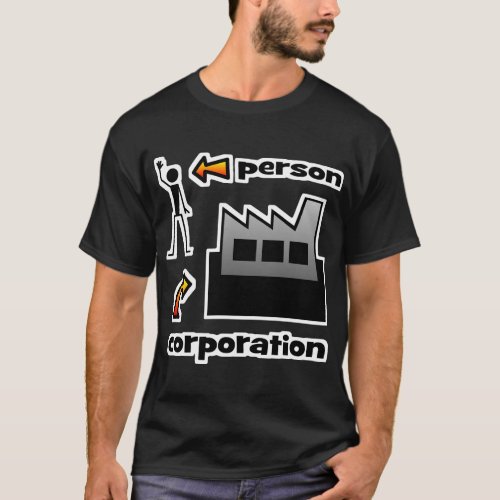Person vs Corporation Tees



Arrows clearly indicate what is a person and what is a corporation on the front, "Sticky", a generic stick figure, declares "I AM A PERSON" on the back. Customize the text with your own slogan, if desired. A person (plural: persons or people; from Latin: persona, meaning "mask") is a being, such as a human, that has certain capacities or attributes constituting personhood, the precise definition of which is the subject of much controversy. Prior to the advent of Christianity, the word "persona" (Latin) or "prosopon" (Ï€Ïόσωπον: Greek) referred to the masks worn by actors on stage. The various masks represented the various "personae" in the stage play, while the masks themselves helped the actor's voice resonate and easier for the audience to hear. In Roman law, the word "persona" could also refer to a legal entity. The concept of a "person" was further developed during the Trinitarian and Christological debates of the first through sixth centuries. Since then, a number of important changes to the word's meaning and use have taken place, and attempts have been made to redefine the word with varying degrees of adoption and influence. Personhood is the status of being a person. Defining personhood is a controversial topic in philosophy and law, and is closely tied to legal and political concepts of citizenship, equality, and liberty. According to law, only a natural person or legal personality has rights, protections, privileges, responsibilities, and legal liability. Personhood continues to be a topic of international debate. Historically, personhood was questioned during the abolition of slavery, the fight for women's rights, debates about abortion, fetal rights and reproductive rights as well as debates about corporate personhood. Various specific debates have focused and continue to focus on questions about the personhood of different classes of entities. Historically, the personhood of woman and slaves has been a point of social upheaval. Today, most adult humans are usually considered persons, but depending on the context, theory or definition, the category of "person" may be taken to include such non-human entities as animals, corporations, artificial intelligences, or extraterrestrial life; and may exclude some human entities in prenatal development or those with extreme mental impairments or injuries. As a matter of interpretation of the word "person" in the Fourteenth Amendment, U.S. courts have extended certain constitutional protections to corporations. Opponents of corporate personhood seek to amend the U.S. Constitution to limit these rights to those provided by state law and state constitutions. Others argue that corporations should have the protection of the U.S. Constitution, pointing out that they are organizations of people, and that these people should not be deprived of their human rights when they act collectively. In this view, treating corporations as "persons" is a convenient legal fiction that allows corporations to sue and to be sued, that provides a single entity for easier taxation and regulation, that simplifies complex transactions that would otherwise involve, in the case of large corporations, thousands of people, and that protects the rights of the shareholders as well as the right of association. Some have argued in court that corporations should be allowed to refuse to hand over incriminating documents under the Fifth Amendment. In one case, "[a]ppellants [suggested] that the use of the word "taxpayer" several times in the regulations requires that the fifth-amendment self-incrimination warning be given to a corporation." However, the court did not agree in that 1975 case. The Green Party, the Women's International League for Peace and Freedom, Democracy Unlimited, and former Vice-President Al Gore have objected to the idea of corporate personhood, focusing on constitutional protections—such as the right to contribute to political campaigns—that are granted to corporations. Gore argues that the 1886 Southern Pacific decision entrenched the 'monopolies in commerce' that Thomas Jefferson had wanted to prohibit. Since the Supreme Court's ruling in Citizens United v. Federal Election Commission in 2010, upholding the rights of corporations to make political expenditures under the First Amendment, there have been several calls for a US Constitutional amendment to abolish Corporate Personhood.


